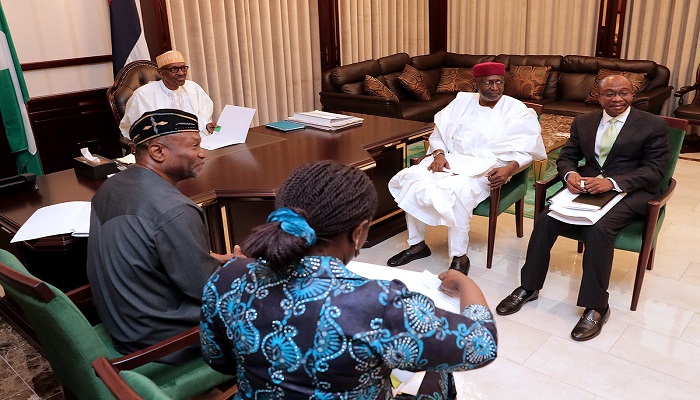Nigeria’s President Muhammadu Buhari declared on Monday that he intends to run for the presidency again come 2019. Shortly after the news, the stock market fell to its lowest in 3 months, allowing some critics to blame the fall on the President’s re-election bid.
Understandably, this has elicited some concerns among investors who worry about the potential impact of his re-election bid on the investing in Nigeria. Nairametrics Founder, Ugodre Obi-chukwu, took on this question at the Everyday Money Matters show on Lagos Talks 91.3. He provided an insight into some of the likely risk-related issues that investors may have to factor in when they decide on their investment goals for the rest of the year.
We have collated some of these issues for our followers to read and discern. Remember, you can tune in every Wednesday on Lagos Talks 91.3 to listen in to the show as well as ask questions on any Money-related issues that are pertinent to you.
Niger Delta Crisis
There is palpable fear that the Niger Delta Militants could stage a comeback as a form of protest against the planned reelection bid of the president. If this were to occur, then it could threaten the upstream section of the oil sector and affect Nigeria’s opportunity to pump oil. Nigeria is still a largely oil based economy and relies on the black gold to fund government business. The last spate of attacks (in 2016) on oil installations adversely affected crude oil output and quickened Nigeria’s slide into the throes of recession. It is not surprising that the country’s climb out of recession also coincides with the ceasefire announced by the militants.
Political Infighting
There have been rumors of infighting in the ruling APC Government. Political analysts indicate leaders of the party are divided as to whether to support the president’s rerun or not. This is likely to affect policymaking at some point, derailing the small progress being made in the economy. There is also the risk of political instability ahead of 2019 as political parties jostle for voters. Electioneering has always been feisty in Nigeria and it is likely that things could even get worse.
Lack of focus
Dovetailing from the above, a rerun is very likely going to affect the government’s focus in the next few months. Most senior officials of the government could switch to election mode and reduce their focus on resuscitating a rather weak economy. Nigeria’s economic growth is still anaemic and the fragile nature of recovery could disintegrate if government officials fail to execute what is left of an already underwhelming economy agenda.
The country is yet to pass the 2018 budget, over four months into the year. In a bid to smoothen his nomination by the party, the president could resort to sacrificing technocrats for career politicians.
Insecurity
President Buhari campaigned largely on the back of fighting corruption and securing the lives of property of Nigerians. Ironically, insecurity has reached news heights under his presidency. Nearly every part of the country is reeling from one major insecurity to another. From herdsmen crisis to kidnapping, ethnic cleansing, cession threats etc. it has been bloody for most parts. There is fear that this could continue on the back of his re-election bid.
Insecurity indirectly leads to an increase in external borrowing costs, as lenders will add a premium to compensate for the additional risk. Worsening security means the government will have to channel resources to buy equipment and the armed forces, rather than productive areas of the economy. This again is a critical risk for investing in the country and one that you must watch closely.
Diaspora
Nigerians in Diaspora are increasingly disenchanted with the situation in the country and have protested whenever they have the opportunity too. Reports indicate there was protests by Nigerians in the UK over the President’s reelection bid. A re-election bid for an unpopular president (at least in diaspora) could shut the doors to remittances and diaspora investments which Nigeria needs to propel the economy. This could create an exchange rate risk down the line.
Emigration
Most people we have spoken to lately believe Nigeria is in a major emigration bubble. Thousands of young Nigerians have left the shores of this country in search of greener pastures. The implication is that more skilled workforce is leaving the country further weakening our ability to compete in an ever competitive global market. This might not be an immediate risk to an investor but it’s an inherent one as a dearth of skills affects the ability of local companies to continue to provide innovative products and services that can sustain profitability growth.
Foreign Investors
They panic at the slightest sight of insecurity or political instability. Worst still they scamper out of the country with their money if Buhari’s re-election big rears its head as a major country risk. The first sign here will be the stock markets. Once it starts to become volatile, then you can expect them to exit the country. The Nigerian Stock Exchange (NSE) All-Share Index dipped sharply when the President announced his reelection bid. A rapid exit from the country leads to pressure on the country’s reserves. The government will, in turn, be forced to depreciate the currency or apply supply management measures.
There no guarantees that any of the risks listed above will crystalize. However, as an investor, it is important that you are well aware of any potential risk to your investments and take actions to mitigate such risk.
